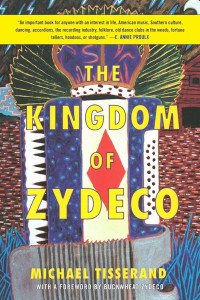 Brendan Foreman wrote this review.
Brendan Foreman wrote this review.
As a companion to his superb book The Kingdom of Zydeco Michael Tisserand has compiled this equally superb collection of zydeco music. It only makes sense to provide a soundtrack to a book devoted to such a distinctive genre of music. From the very first track, Amede Ardoin’s classic “Two Step de Eunice (Eunice Two Step),” this CD serves as both a history lesson and a party mix; and it is indispensable for appreciating Tisserand’s book.
For the uninitiated, the music of zydeco sounds much like what one would get if they combined the structure and feel of traditional French music with the rhythm of African music, played with the heartfelt emotion of the blues and the drive of German polka. For the most part, this is rough-and-ready rural dance music, meant to stimulate the feet into some serious, all-night dancing. The ubiquitous accordion drives the music forward as both the melody instrument as well as percussion. A rubboard player will often add a dimension of beauty and texture to the song in a sort of “harmony rhythmist” position.
As noted before, the history lesson begins with the very first track, a 1929 song recorded by Amede Ardoin (with Cajun fiddler Dennis McGee) for Columbia Records. This is a remarkably accessible number, “simultaneously evoking,” as Tisserand puts it, “joy, triumph, anguish and sadness.” It is no wonder that, upon hearing this and other Ardoin tracks, many Creole artists adopted this new style of music.
Rather than proceeding chronologically to another classic cut from, say, the ’30s, Tisserand follows the Ardoin track with the very current and hard-driving “Broken Hearted” by Zydeco Force. The contrast is striking, yet not intrusive — Zydeco Force has a much more polished, smooth, almost urban sound.
Tisserand continues the CD in this manner, jumping back and forth in time and giving a sense of the scope and depth of zydeco as a musical style, both presently and in the past. Thus, we go from the blazing “Tu m’as fait brailler (You made me cry)” of John Delafose and the Eunice Playboys in 1992 to the early ’80s recording of the easy-going “Oh Yes I’m Going Away” by Ambrose Sam, to a recording of Clifton Chenier in the late ’70s.
A style of music with this many parents is easily adapted to and influenced by other genres. Almost from its beginning, artists have been combining blues and R&B with their style of zydeco, often quite playfully. Tisserand doesn’t back away from illustrating this willful intermingling of genres with a number of choice cuts. The King of Zydeco, Clifton Chenier, is represented with “Grand Prix,” a deep-felt, French version of the 1961 Fats Domino hit, “What a Price.” Complete with the simplified boogie-woogie piano and blaring sax solos of early rock ‘n’ roll, this song demonstrates why Chenier’s combination of R&B and zydeco was so popular in the early part of his career in the ’50s.
A few tracks later, “C Key Blues,” recorded in the late ’60s by Little Latour, is a harrowing blues/zydeco hybrid, featuring an amazing drone effect on the accordion. C. J. Chenier, Clifton’s son, appears next with another hybrid, “Louisiana Down Home Blues.” Based on the George Jackson song “Down Home Blues,” this is a strident blues number, for which C. J. actually learned some French. The ease with which one can switch from blues to zydeco and back again illustrates the common African-American ancestry of both styles.
Besides Amede Ardoin and the Cliftons, many other zydeco greats are represented here, from Buckwheat Zydeco, performing the rockabilly-ish and appropriately named “Hot Tamale Baby,” to Les Freres Carrieres (that is, brothers Bebe and Eraste “Dolon” Carrieres), illustrating the very early styles of zydeco in “Zydeco a Carriere.” Another set of real old-timers that Tisserand brings in is Canray Fontenot and Bois Sec Ardoin, here with “Hack a ‘tit Moreau (Bonsoir Moreau),” recorded in 1966 by Ralph Rinzler.
There are plenty of the current generation of artists here as well, including Keith Frank singing a very contemporary, almost country “Bernadette c’est ma ‘tit Creole,” and Rosie Ledet with her forthright “I’m Gonna Take Care of Your Dog.” This song was Ledet’s response to many of zydeco’s predominantly male-penned lyrics. Other modern artists include Nathan Williams and the Zydeco Cha Chas and Chris Ardoin and Double Clutchin’.
Although Tisserand could have opted for a collection of more famous zydeco hits, including many more by Buckwheat Zydeco or Clifton Chenier, he concentrated instead on creating a multifaceted document that tours the Kingdom of Zydeco aurally just as his book tours it verbally. This CD will not disappoint either newcomers to this realm of music or seasoned travelers.
For a taste of the Cajun side of Louisianan music, check out Gary Whitehouse’s reviews of Beausoleil’s Arc De Triomphe Two Step and David Doucet’s 1957: Solo Cajun Guitar. Also, don’t forget his review of the double CD set, Allons en Louisiane.
(Rounder, 2000)
